UAMS, Community Partners Work Together to Increase Spanish-Language Breastfeeding Support
| Last year, the University of Arkansas for Medical Sciences (UAMS) Institute for Community Health Innovation partnered with Cuenta Conmigo Cooperative to train community health workers to become certified lactation counselors (CLCs). Spanish-speaking community health workers completed 95 hours of training and can now take the certification assessment in the fall.
A certified lactation counselor (CLC) is a clinical provider dedicated to promoting, protecting and supporting breastfeeding. CLCs possess the skills, knowledge and abilities to provide clinical breastfeeding support and management to families considering breastfeeding or experiencing challenges.
Studies show many Hispanic women living in the U.S. use a combination of breast milk and formula to feed their babies and do not exclusively breastfeed for the recommended time frame. Researchers at the Institute for Community Health Innovation suggest the reason behind lower exclusive breastfeeding rates among Hispanic women is due to cultural and language barriers, particularly among women who immigrated to the U.S.
“Breastfeeding strengthens the bond between mom and baby, but many Hispanic women who do not speak English struggle in asking for breastfeeding recommendations or help because they don’t know how to approach a health care provider, or they are scared to,” said Laura Mariana Echavarri Ibarra, a project manager at the institute. “Community health workers help to bridge the gap between health care providers and expecting moms by offering support, guidance, translation — whatever a mom may need.”
By providing in-language lactation counseling, community health workers can help reduce cultural and language barriers and offer breastfeeding knowledge and techniques to Hispanic moms who want to exclusively breastfeed.
“Now that I have completed the training, I feel more comfortable and knowledgeable providing breastfeeding information and techniques to my clients,” said Marisela Sandoval, a community health worker with UAMS. “Armed with this knowledge and new practices, I feel confident my clients will want to breastfeed for longer periods of time to ensure their babies get a healthy start in life.”
Breastmilk is a valuable source of nutrition for many babies as it contains vital nutrients that help your baby’s digestion system form and protect from certain infections. The World Health Organization recommends exclusive breastfeeding — meaning that a baby only receives breast milk — during the first six months of a baby’s life to achieve optimal growth, development and health.
Breastfeeding also offers several benefits for both mom and baby, including a lower risk of Type 2 diabetes. For the mother, breastfeeding provides a closer bond with her baby and saves time and money. Breastfed babies have a reduced risk of asthma, childhood obesity, ear infections and sudden infant death syndrome (SIDS).
In addition to training community health workers, UAMS is working with partners to support families by deploying mobile prenatal care units and expanding doula services across the state to fill the gaps in maternal and child health. The latest initiative aims to provide contraception services and reproductive health education to women living in rural parts of Arkansas. Learn more at communityhealth.uams.edu.
